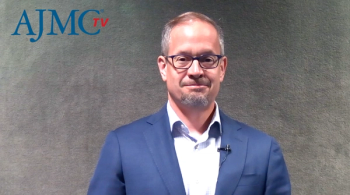
Insurance
Latest News

Latest Videos

Podcasts
CME Content
More News

Emma Achola-Kothari, PhD, explains that younger Medicare beneficiaries without supplemental coverage face high costs, while dual-eligible beneficiaries in Medicare Advantage plans struggle with provider access.

Emma Achola-Kothari, PhD, explains that Medicare beneficiaries younger than 65 years without supplemental coverage face greater financial and access barriers to care, while dual-eligible individuals experience fewer of these challenges.

Covered California and Health Net’s novel data exchange initiative significantly improved quality measurement and potentially reduced costs by more than $640,000.

Proposed Medicaid cuts in the Republican budget proposal hold significant implications for health care access and coverage.

The Maryland All-Payer Model was associated with an increase in population-based rates of elective major joint replacements, with a more pronounced effect observed in Maryland-only hospitals.

Physician groups under 2-sided risk–based Medicare Advantage provide care associated with higher quality and efficiency compared with care by these same groups under fee-for-service Medicare.

Laundromats offer a promising outreach setting for Medicaid payers because Medicaid enrollees represent a majority of laundromat users and have disproportionately high levels of unmet needs.

Asembia’s AXS25 Summit covered a variety of relevant topics in the pharmaceutical industry, from the effects of the new administration to how artificial intelligence (AI) is reshaping the patience experience.

Timely outpatient telepsychiatry care for Medicaid enrollees was associated with lower hospitalization rates and comparable overall costs, supporting its potential role in value-based care models.

Self-paying patients can now obtain semaglutide at a lower cost through trusted telehealth providers.

Approximately 1 million Aetna members will need new coverage with the announcement that CVS will be leaving the Affordable Care Act (ACA) individual exchange business next year.

Experts urge for technology-driven, collaborative solutions as patients shoulder a growing burden of prescription costs.

New treatments for neovascular age-related macular degeneration (nAMD) and diabetic macular edema (DME) enhance patient care with gene therapies and new mechanisms of action on the horizon, explained Casey Koch, PharmD, from Select Health.

Early actions by the new administration signal major changes in health policy, taxes, and pharmaceutical pricing.

Medicaid beneficiaries face higher rates of pulmonary hypertension, with significant economic burdens and racial disparities in prevalence and costs.

Expanding Medicare coverage for glucagon-like peptide 1 (GLP-1) receptor agonists could significantly reduce obesity-related health issues, but it also risks adding tens of billions in new costs, highlighting the need for smart policy strategies to ensure access, affordability, and long-term sustainability.

Asembia's AXS25 Summit will unite more than 8000 key decision-makers to explore pharmacy innovation, artificial intelligence, policy, and patient care from April 27 to May 1 at Wynn & Encore in Las Vegas, Nevada.

On this episode of Managed Care Cast, Brady Post, PhD, lead author of a study published in the April 2025 issue of The American Journal of Managed Care®, challenges the claim that hospital-employed physicians serve a more complex patient mix.

Richard Hughes IV, JD, MPH, spoke about the upcoming oral arguments to be presented to the Supreme Court regarding the Braidwood case, which would determine how preventive services are guaranteed insurance coverage.

Sam Peasah, PhD, MBA, RPh, director of High-Value Health Care Value-Based Pharmacy Initiatives at UPMC Health Plan, discusses ways that health plans can help reduce the cost burden of medications to improve adherence.

The executive order targets lower drug prices through Medicare reforms, anticompetitive crackdowns, and transparency mandates.

JC Scott, CEO and president of The Pharmaceutical Care Management Association, discusses current efforts in increasing biosimilar adoption and pharmacy benefit manager (PBM) reform.

Galen Shearn-Nance, BS, and Johnie Rose, MD, PhD, of Case Western Reserve University, acknowledge key limitations of their study and prioritize areas for further research.

No significant differences in treatment or outcomes were found between most Medicare Advantage (MA) and fee-for-service (FFS) beneficiaries with breast cancer, but Black patients with FFS Medicare were less likely to receive standard treatment.

The California-based entities plan to offer new Medicare Advantage (MA) products in select counties by this fall.












